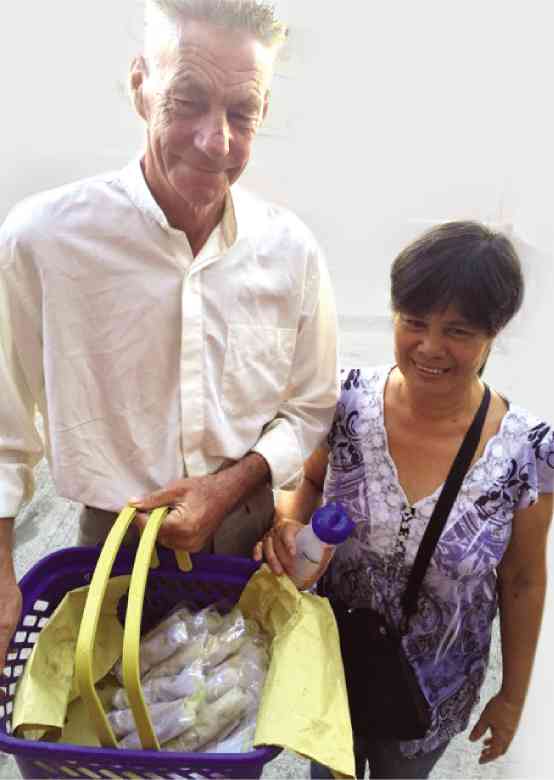
BRYAN Reano and Rosalinda Labajo selling “lumpia” and “turon” on the streets of Bacolod City CARLA P. GOMEZ/INQUIRER VISAYAS
BACOLOD CITY—Bryan Reano, 61, would be best remembered here as the British expatriate who sold lumpia and turon and made these native delicacies his own.
But his is a story about the highs and lows of life which, for Reano, ended on Dec. 22 at a hospital here where he had waged a losing battle with pneumonia.
After serving the well-heeled as a waiter in Paris’ glitzy restaurants, Reano took to the Internet to look for a partner and found Rosalinda Labajo, 58, who had been earning a living trading fish in Talisay City, also in Negros Occidental.
Reano came to this city in February 2012 to be with Labajo and the bond was formed.
But while theirs is a relationship made for the movies, it’s not stuff that fairy tales are made of. There is no happy ending where the prince weds the princess as fireworks light up the sky and adoring subjects applaud.
Reano would fall ill with pneumonia on Dec. 14, which Labajo would attribute to the days they spent selling lumpia and turon in the city streets under the intense heat of the sun.
It was a task that the couple needed to do because, while Reano invested in fish trading and bought two boats, the catch was not enough to sustain the operations.
The business was struggling but it was made worse by an accident that Reano met and during which he broke a leg and had to be hospitalized. Labajo was forced to sell Reano’s two boats to pay for the hospitalization.
The couple tried to fill the income gap by preparing lumpia and turon to sell in the city streets. Their concoctions soon became a hit, with Reano’s lumpia featuring spicy beef that city residents had not tasted before.
As the couple sold lumpia and turon in the city streets, Reano met and made friends and fell deeper in love with the place he had started calling home since 2012. He had said he would never return to his country of origin, the United Kingdom.
“I’m going to die here in the Philippines,” Reano had told friends.
The second time Reano was hospitalized was the biggest blow to the couple, income-wise.
The lumpia and turon business had to stop because Labajo had to be with Reano at Corazon Locsin Montelibano Memorial Regional Hospital, where the British expatriate had been admitted.
According to Labajo, while doctors had given advice that Reano could die anytime, she clung to prayers and wished for a miracle.
Labajo had hoped Reano would live longer after her British partner stopped smoking, going cold turkey, and shunned alcoholic drinks.
Reano had developed a cold that he dismissed as just allergic reaction to heat.
God, however, had other plans. At 6:40 a.m. on Dec. 22, Reano died eight days after he was admitted to the hospital.
“It’s painful to lose him,” said Labajo. “We had planned to grow old together,” she said.
The hospital bills had piled up and, while waiting for permission to bury him from Reano’s next of kin in the UK, Labajo had to cough up P1,500 a day to keep Reano’s body at a morgue here.
Help came from the place that Reano had learned to love and which loved him back.
Friends and customers who had learned of Reano’s plight put together more than P200,000 to pay for his hospital and funeral bills.
Reano was cremated on Dec. 29 and, as he had wished, Labajo would drop his ashes in the waters of Boracay, the world-famous resort island.